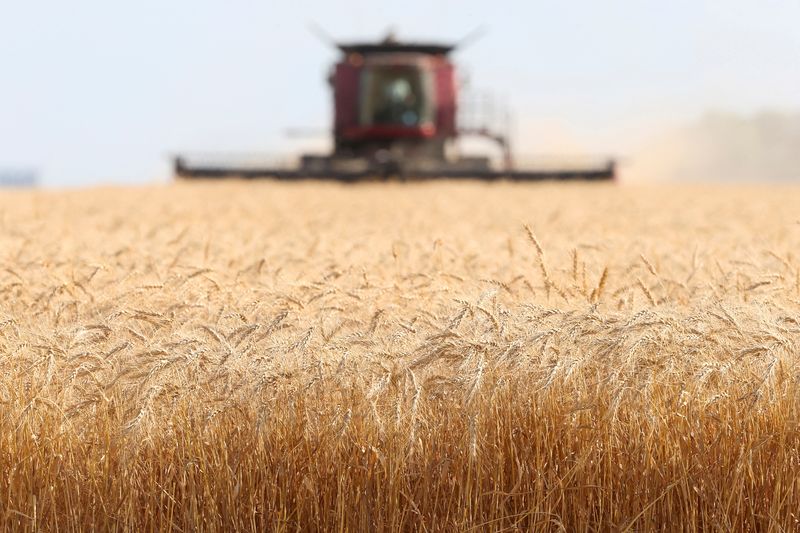By Julie Gordon and Rod Nickel
OTTAWA/WINNIPEG (Reuters) - Surging oil and wheat prices are allowing commodities exporter Canada to weather an economic storm threatening to tip many of its fellow G7 rich nations into recession.
Russia's invasion of Ukraine in February stranded the region's wheat stockpiles and triggered Western sanctions on Russian crude, sending commodity prices surging. Central banks jumped in to raise interest rates to stem inflation.
As a result, many countries face far lower growth this year than expected as they emerged from the coronavirus pandemic.
But as the world's No.4 oil producer and No.4 wheat exporter, Canada's fortunes are following a different trajectory altogether. Commodities and agriculture account for about 10% of its economy.
"If you look at the goods that Russia and Ukraine export, these are essentially the same basket we export," said Pedro Antunes, chief economist at the Conference Board of Canada.
"That is going to drive not only profits (for) corporations, but also governments."
Prices of crude and wheat slid in late June on fears of a global recession reducing demand, but remain elevated enough to buoy Canada's economy, helping offset a housing slowdown.
The International Monetary Fund (IMF) and economists surveyed by Reuters forecast Canada will lead the G7 in economic growth this year after trailing many of its peers in 2020 and 2021, when it adopted more stringent coronavirus restrictions.
In April, the IMF forecast Canada's gross domestic product would grow 3.9% this year, leading the G7 but down slightly from a pre-war forecast of 4.1%. By contrast, the IMF slashed the United Kingdom's growth forecast to 3.7% from 4.7%.
With the economic outlook worsening since then, economists told Reuters they expect even less growth for most G7 nations, with Canada still seen relatively strong at 3.4%-3.8% GDP growth this year.
"We still have Canada at the top of the deck in 2022, due to more of a bounce from (the loosening of) prolonged restrictions and the commodity price support," said Doug Porter, chief economist at BMO Capital Markets.
Graphic: G7 economic growth projections, 2022 - https://graphics.reuters.com/CANADA-ECONOMY/COMMODITIES/mypmnrqgkvr/chart.png
'NIGHT AND DAY'
To be sure, it isn't all smooth sailing for Canada.
Expensive commodities have driven inflation to a near 40-year high, forcing the Bank of Canada to hike interest rates, making business investment more expensive.
Ottawa's move to curb emissions by 2030 is also holding oil companies back from expanding production, capping the potential economic growth this time around.
Canada's daily oil production this year is expected to rise just 2-4% from 2021 despite the high prices, said Kevin Birn, analyst at S&P Global (NYSE:SPGI) Commodity Insights.
Still, the turnaround from 2020, when oil prices collapsed, has been dramatic in oil-producing Alberta, which on Tuesday reported a surprise C$3.9 billion ($3 billion) budget surplus for fiscal 2021-22.
Take the experience of Red Deer, Alberta-based Roll'n Oilfield Industries. Two years ago, it was operating just 20% of its rigs to service oil wells and forced to cut jobs.
"It's like night and day, the difference now," said Brad Rowbotham, the company's president. "We can't find enough people to crew all the rigs. Everything is booked."
'VERY, VERY STRONG'
A global recession could spoil the oil party, but its impact on demand is uncertain. Crude demand fell sharply during the 2020 and 2007-09 recessions, but more modestly in 1990-91 and 2001, said Morgan Stanley (NYSE:MS) commodity strategist Martijn Rats.
And inflation will also inevitably dampen commodity demand, says Tony Tryhuk, manager of commodity trading at RBC Dominion Securities, warning that the bull market could be "all but over".
For now, prices are strong and commodity producers have the added bonus of a strengthening U.S. dollar, instead of the more typical situation of the Canadian dollar surging as oil prices rise, making Canada's exports less competitive.
Farm production is also showing a rebound. Canada's agriculture ministry forecasts a grain and oilseed harvest of 86.5 million tonnes, up 33% from last year when drought hit production.

Food shortages due to war in Ukraine look to keep crop prices elevated, said Craig Klemmer, manager of economics at Farm Credit Canada, a farm lender.
"Overall, global demand for 2022 and into 2023 is going to be very, very strong," said Klemmer.